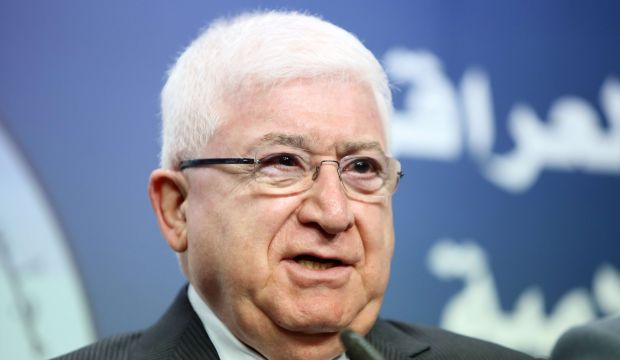
Fuad Masoum, the new president of Iraq and a veteran Kurdish politician, speaks during a press conference in Baghdad on July 24, 2014. (AFP PHOTO / ALI AL-SAADI)
“[The Iraqi government] is seeking to take decisive and resolute steps and reconsider some resolutions and laws in order to achieve national reconciliation and bring security and welfare,” a statement quoted Massoum as saying during a meeting with Mladenov.
“National reconciliation is a social need; therefore, it cannot be achieved via meetings, conferences and pretense only. Rather, it requires strong will and actual participation from everyone, particularly since Iraq now is in need of reconciliation and solidarity more than ever,” the statement continued.
Since the downfall of the former dictator Saddam Hussein following the US-led invasion of Iraq in 2003, Iraq has been increasingly beset by bloody sectarian violence and conflict at all levels, the most recent example of which has been the rise of the Sunni extremist organization the Islamic State of Iraq and Syria (ISIS).
In particular, Iraq’s Sunnis, politically predominant in the pre-2003 era, have become increasingly disillusioned and disaffected by the rise of Shi’ite parties to power in Iraq, something experts say has contributed to the success of ISIS and groups like it.
The US has called on the government of Shi’ite prime minister Haider Al-Abdadi to begin a reconciliation process with Iraqi Sunni leaders, and has warned that it will be necessary to integrate Sunni tribal militias into the security forces in order to defeat ISIS, something the previous government led by Nuri Al-Maliki was deeply reluctant to do.
Massoum has tasked his Vice-President Iyad Allawi with following up on the issue of national reconciliation. The Shi’ite politician has held a series of meetings with exiled politicians and tribal leaders in Jordan, UAE and Qatar in a bid to involve them in the national reconciliation project.
During his meeting with the UN special envoy, Massoum reiterated that “extensive national reconciliation is the only way to get rid of difficulties and help maintain security and social peace.”
The United Nations would support Iraq in all fields and help it overcome its problems, Mladenov pledged.
The Iraqi president told a group of reporters in November that he would “adopt an extensive national reconciliation project early next year.”
“President Massoum possesses an integrated program and a clear vision regarding national reconciliation and once he is done with consultations and meetings, practical steps will begin,” a spokesman for the Iraqi presidency, Khalid Shawani, told Asharq Al-Awsat.
According to Shawani, Massoum’s national reconciliation project will focus on two tracks: a political track, involving consultations with members of all of Iraq’s sects and ethnicities, and a legislative track, involving the review of existing legislation with an eye to fostering a greater degree of political and social reconciliation.
The project will address several critical issues, such as the sectarian basis of Iraq’s political system (which unofficially reserves the presidency for a Kurd, the premiership for a Shi’ite, and the speaker of parliament’s chair for a Sunni), the issue of former Ba’athists and military personnel who fought against US forces, and individuals harmed by Saddam Hussein’s regime, Allawi previously said in a statement.
While these issues have been raised before, some political leaders said that a push to tackle Iraq’s sectarian crisis had been given added urgency by the rise of ISIS and the threat of the country’s disintegration along ethnic and sectarian lines.
Speaking exclusively to Asharq Al-Awsat, Iraqi Communist Party politburo member Raed Fahmy said unlike the past, the present political conditions in Iraq encourage national reconciliation efforts.
“National reconciliation this time seems to be more of a reality than just mere words,” he said.

Trackbacks/Pingbacks